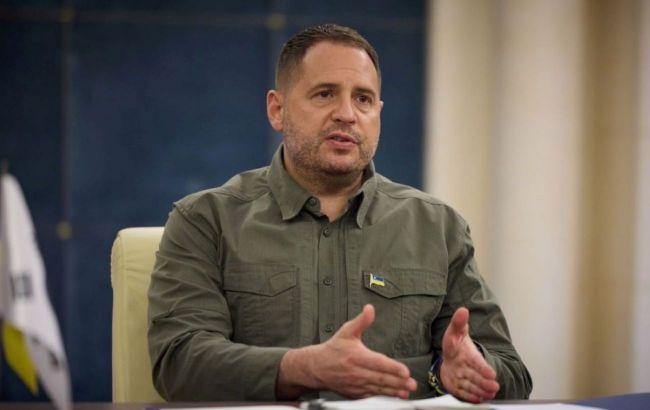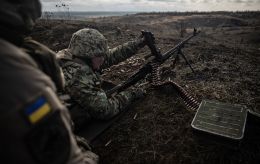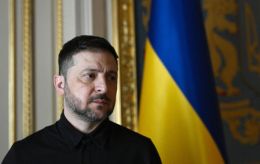Key outcomes of Peace Summit on Ukraine in Saudi Arabia: Positive signals emerge
 The Head of the Office of the President, Andriy Yermak, brought positive signals from the summit in Jeddah (Photo: president.gov.ua)
The Head of the Office of the President, Andriy Yermak, brought positive signals from the summit in Jeddah (Photo: president.gov.ua)
Over the past weekend, on August 5-6, international negotiations were held in Saudi Arabia to discuss how the Russian-Ukrainian war should come to an end. For the first time in such a format, China joined the discussions, and it is expected that its input could influence Russia's position.
RBC-Ukraine reports on the positive signals from the summit in Jeddah, Saudi Arabia.
The two-day meeting in Jeddah was part of Ukraine's diplomatic initiative. The goal was to secure support for a peace formula from Western allies and countries of the Global South, which have refrained from taking sides in the conflict.
Furthermore, in Kyiv, there were hopes for the agreement on key principles for ending the war with Russia and laying the foundation for a Global Peace Summit scheduled for this fall.
"The third step (following the meetings in Copenhagen and Jeddah- Ed.) will be the organization of the Global Peace Summit. We are working towards making it happen this autumn," President Volodymyr Zelenskyy stated during a meeting with Ukrainian ambassadors.
Representatives from Russia were not expected to be invited to the summit in Saudi Arabia. However, judging by the information available, participants managed to achieve positive results.
Peace formula. Implementation one step closer
Ahead of the summit, the Deputy Head of the President's Office, Ihor Zhovkva, stated that among its participants, responsibility for specific points of the peace formula would be distributed.
For instance, if China is concerned about nuclear security, it could take leadership in that aspect. Meanwhile, Brazil could take on the point concerning environmental issues.
The Financial Times, citing a European diplomat, notes that all delegates agreed on the necessity of respecting Ukraine's territorial integrity and sovereignty. They also agreed to establish working groups for the 10 points of the peace formula.
These ten points are:
- Nuclear security with the immediate return of the Zaporizhzhia Nuclear Power Plant under Ukraine's control.
- Food security with uninterrupted operation of the Black Sea Grain Initiative.
- Energy security with the protection of Ukrainian facilities through air defense/missile defense systems.
- Release of prisoners and deported Ukrainians.
- Restoration of Ukraine's integrity based on the UN Charter.
- Withdrawal of the Russian army and cessation of hostilities.
- Establishment of a tribunal for Russian war crimes and compensation for damages to Ukraine.
- Countering ecocide.
- Providing Ukraine with long-term security guarantees.
- Formalizing the end of the war with the signing of a multilateral peace treaty.
 The Head of the Office of the President, Andriy Yermak, considers the summit in Jeddah to be historic (Vitalii Nosach/RBC-Ukraine).
The Head of the Office of the President, Andriy Yermak, considers the summit in Jeddah to be historic (Vitalii Nosach/RBC-Ukraine).
The summit was held at the level of advisors to the leaders of the participating countries. According to the head of the Office of the President of Ukraine, Andriy Yermak, consultations on key principles were productive, with each participant voicing their position and perspective.
"There were different views, but all affirmed their countries' commitment to the principles of the UN Charter, international law, and respect for the sovereignty and territorial integrity of states. It is on these principles that President Zelenskyy's peace formula is built," he added.
He also noted that just two months ago, representatives from one of the countries had been discussing the war using Russian narratives. However, after the summit, their position "underwent significant changes." He did not specify which country he was referring to.
In any case, the meeting marked a step toward the practical implementation of Ukraine's peace initiatives. Most participants have already defined their roles in implementing specific points of the peace formula and agreed to continue working at various representative levels.
"The most important thing is that we have come a step closer to the realization of the Ukrainian peace formula. We have also agreed that this format will be continued, and we will work on organizing a peace summit, followed by efforts to implement each of the 10 points," Yermak added today.
Russia's isolation will strengthen
The New York Times reported with emphasis on the Jeddah summit. According to the article, the meeting over the weekend served as a starting point for Ukraine's efforts towards international isolation of Russia and undermining its positions.
This is indicated by the composition of participants. If the first meeting in Copenhagen (Denmark) had around 10 countries attending, with India and South Africa's participation considered a success in itself, the event in Saudi Arabia five weeks later was three times larger in scale.
In particular, delegations from Saudi Arabia, Australia, Argentina, Bahrain, Bulgaria, Brazil, the United Kingdom, Denmark, Estonia, the European Union, Egypt, India, Spain, Italy, Jordan, Canada, Qatar, China, Kuwait, Latvia, Lithuania, the Netherlands, Germany, Norway, the United Arab Emirates, South Africa, Poland, South Korea, Romania, Slovakia, the Union of the Comoros Islands,Türkiye, Finland, France, Czechia, Chile, Sweden, Japan, and the United Nations personally or in online format discussed the issue of the Russian-Ukrainian war.
The fact that approximately 40 countries participated in the consultations speaks to a strong global interest in a lasting and robust peace.
Equally important is the presence of China, India, South Africa, and Brazil at the summit. This includes all BRICS members except the Russian Federation. Analysts view this as an attempt by these partners to improve their international image and hedge their bets in case of Russia's defeat.
According to Charles Kupchan, Senior Fellow at the Council on Foreign Relations (CFR) in Washington, this allows Ukraine to appeal to global public opinion by swaying countries such as Saudi Arabia, Brazil, and India to its side.
"I do think it's important that China is there. The fact that China has gone despite Russia's absence says to me that the Chinese are carefully hedging away from their unstinting support for Moscow in this war," he said cited by DW.
Chinese "breakthrough"
Ukrainian Minister of Foreign Affairs, Dmytro Kuleba, had anticipated the participation of Chinese representatives and referred to it as a real breakthrough and a historic victory.
The Chinese side has long proposed a mediation role in the Russian-Ukrainian war. Officially, Beijing considers itself neutral, but the West criticizes its close ties with Russia.
A special envoy for Eurasian affairs, Li Hui, attended the Jeddah summit.
 Photo: China sent its special envoy for Eurasian affairs, Li Hui, to the Jeddah summit (Russian media)
Photo: China sent its special envoy for Eurasian affairs, Li Hui, to the Jeddah summit (Russian media)
"It is important for these negotiations to continue because ultimately we will probably come to a point where it's time to move from the battlefield to the negotiating table. China plays an important role here, primarily because if someone has influence over Putin, it's Xi Jinping. We will need China to press Moscow at the right moment," noted analyst Charles Kupchan.
As reported by FT, China has indicated that it will continue to participate in international negotiations regarding the resolution of the war. Its constructive presence has inspired Ukraine's allies, and its active involvement in consultations has been seen as a "positive signal."
The article describes the arrival of the Chinese delegate as a "turnaround" and almost a main event in Jeddah. One European diplomat, speaking anonymously, stated that this shows Russia's increasing isolation. Additionally, the Chinese delegation hinted that they would participate in the third meeting at the level of political advisors.
While it's not necessary to speak of a drastic change in China's position, the recent statement from its Ministry of Foreign Affairs can be cautiously interpreted as optimistic.
In a written comment to Reuters, it is mentioned that Li Hui had contacts with all sides involved in the resolution of the war in Ukraine, listened to opinions and proposals, and "consolidated international consensus."
However, it's emphasized that Beijing will continue to strengthen dialogue based on its 12-point peace proposal.
Meanwhile, Ukrainian negotiator Andriy Yermak speaks about the importance of China's position leaning towards the necessity of ending the war. He expresses hope that China, by opposing the use of nuclear weapons in any form, will actively support the point of the peace formula concerning nuclear security.
Was there a Saudi "peace plan"?
The choice of Saudi Arabia as the host country for the summit was not accidental. It provides financial assistance to Ukraine and maintains close ties with Russia.
However, Riyadh clearly intends to strengthen its mediation role. According to DPA, citing sources, Saudi representatives have proposed their "peace plan."
Reportedly, the four-point plan was presented jointly with some other countries. It includes:
- Preserving the territorial integrity of Ukraine.
- Ceasefire on all fronts.
- Commencing peace negotiations under the supervision of the United Nations.
- Prisoner exchange.
It's notable that the plan does not mention the necessity of the withdrawal of Russian troops from Ukrainian territory as a condition for starting negotiations. This is clearly contradictory to the Ukrainian peace formula. Western media rushed to the conclusion that Kyiv seemingly did not insist on adopting the formula in its entirety. However, the President's Office emphasizes that discussions about initiating a peaceful process with Russia were few and far between before de-occupation.

Photo: Advisor to the Head of the Presidential Office, Mykhailo Podolyak, states that the peace formula remains the basic negotiating foundation (Vitalii Nosach / RBK-Ukraine)
"The only fundamental negotiating basis is President Zelenskyy's peace formula. There can be no compromise positions like "immediate ceasefires" or "negotiations here and now" that give Russia time to remain on occupied territories," added Mykhailo Podolyak, Advisor to the Head of the Presidential Office, today.
Yermak, on the other hand, categorically denied discussions of the Saudi plan.
"No other formulas (except the Ukrainian one - Ed.) were discussed either at the joint meeting or in bilateral formats," he noted.
Russia's reaction
Russia's Reaction Deputy Chairman of the Russian Security Council Dmitry Medvedev reacted to the Jeddah meeting by stating that both sides of the military conflict should be involved for successful negotiations. He also ruled out any talks until Ukraine is defeated.
Deputy Minister of Foreign Affairs of Russia, Sergey Ryabkov, mentioned that Moscow intends to discuss the summit's results with BRICS partners. Even the official spokesperson of the Russian Ministry of Foreign Affairs, Maria Zakharova, wrote an article suggesting that Ukraine should allegedly agree to a neutral, non-block, and non-nuclear status for Russia to agree to a peaceful settlement.
"New territorial realities that have emerged as a result of the realization of the right to self-determination by the residents of the 'new regions,' enshrined in the UN Charter, should be recognized. Demilitarization and denazification of Ukraine should be ensured, along with the rights of its Russian-speaking citizens and national minorities," the article by Zakharova stated.
Clearly, at this stage, Russia is not ready to accept even a political defeat. The statements from its spokespersons once again illustrate why Moscow is not being awaited for such a format of meeting. As the Ukrainian peace formula gains more and more supporters, its participation could nullify international efforts.
Regarding BRICS, the participation of Brazil, India, China, and South Africa effectively buried Russia's plans to gather a coalition in support of the war.
"The BRICS countries were present at a high level, and undoubtedly, they (the Russians- Ed.) will not be able to create such a coalition. They only want to create something there, while we have already formed a historic powerful coalition around Ukraine," summarized Andriy Yermak.

